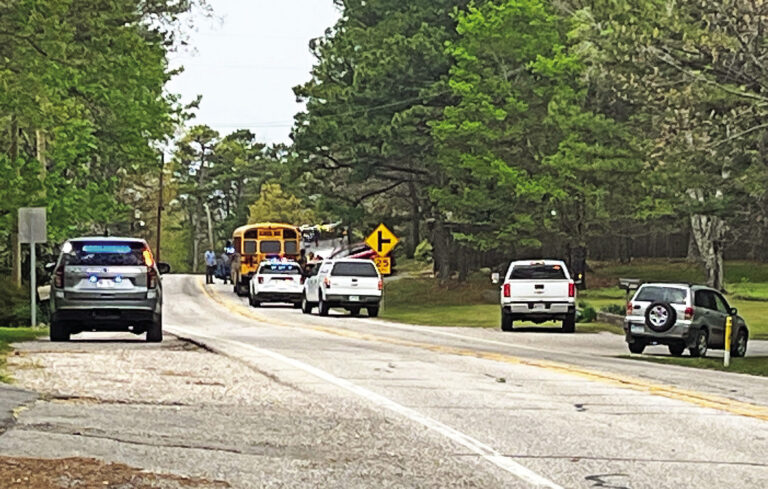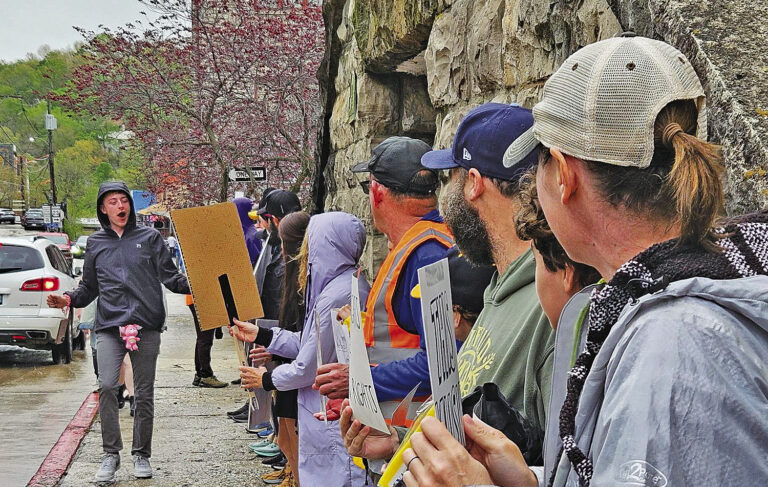The Eureka Springs City Council has asked the city attorney to draft an ordinance that could force a local campground to hook up to the city’s water service for the first time.
At its monthly meeting held Monday, Nov. 27, at The Auditorium, the council voted unanimously to have city attorney Forrest Jacobi draft an ordinance that would require any property owner to connect to city water if their property is within 500 feet of a water line.
That would require Kettle Campground, located on East Van Buren Avenue just west of Eureka Springs Cemetery, to become a city water customer for the first time.
While Kettle Campground has been using the city’s sewer services for years, it has never become a water customer. With the city using water consumption as a means to calculate charges for sewage service, the campground has never paid for sewer use, city public works director Simon Wiley told the council.
“I have told them that I have spoken to [Arkansas Department of Environmental Quality] and we have the right to shut [Kettle’s sewage] off because it is considered illegal dumping,” Wiley told council members. “… We can’t allow illegal dumping.”
Wiley said his department has looked into acquiring a meter that can handle wastewater to determine the campground’s sewage usage because the owners “refuse to connect to the water system.”
The current city code does not require a property owner to sign up for city water service, Wiley told council members.
“In my opinion they should be a part of the city water system,” Wiley said. “….We do have a municipal code that people are required to connect to our sewer system but with the water system they’re not required, in the municipal code, to connect to the water system.
Council member Harry Meyer responded: “Mr. City Attorney, can we pass an ordinance?”
“Would you like me to draft one?” Jacobi responded.
Wiley said no other property in the city has a similar situation.
“I don’t know why we should give them an exception,” Meyer said. “I’m sorry. It just doesn’t make sense, especially a commercial operation.”
Mayor Butch Berry said the agreement originated between the campground and “a former mayor,” and Wiley said easements needed for the sewage line that goes out of city limits were signed by “the county.”
“There is easement that were prescribed, but they were signed by the county, not by the city,” Wiley said. “So the agreements, as far as I can tell … there seems to be an agreement between the pre-existing Kettle Campground and the county instead of the city.”
Jacobi added: “I do not find any of the property owners that necessarily gave that easement. The easement is there but I’m not sure who gave it to whom or why. But it is connected to our sewer system. So, the way it looks to me is the agreement was made between county officials and the owner and it was never adopted by the city. I can’t find anything adopting it from a city standpoint.”
Council member David Avanzino asked Jacobi if the city can force the campground to start paying for sewer service.
“Again, the solution might be put a meter on, but we don’t put meters on sewers,” Jacobi said. “The proper thing is to connect them to the city water line and then base it on the water usage. That’s the proper thing. But again, I couldn’t find anything in an ordinance that says they have to join the city water system.”
Council member Terry McClung asked if the situation could be illegal.
“If they are illegally connected to the sewer line then that’s theft, is that not correct?” Mc-Clung said.
“I don’t know when they connected or how they connected or where the paperwork is saying they’re legally connected,” Jacobi responded, later adding, “I don’t think they’ve been paying for sewage for quite a while.”
McClung said he understands the current owners bought the property from previous owners and “just assumed what they were doing was fine.”
“I understand that point,” McClung said. “But that ignorance is no excuse.”
“If we’re taking their sewage then we need to charge them for it,” Jacobi added.
The property is currently connected to a well for its water service and at one point was connected to a septic tank, Berry told council members.
“If you make them connect to water, that doesn’t mean they’re going to use any of it,” McClung said. “They could still operate off their wells.”
Wiley replied: “They’d be forced to disconnect from a well, according to state and federal law.”
The campground has a fire hydrant on the property just off the street, making it easy to connect to a city water line, Wiley told council members.
“It’s not that expensive for them to connect,” McClung said.
“I’m sure they don’t want to pay the water bill,” Berry replied.
Wiley reminded council members that ADEQ advised that it was an illegal sewage connection if the property owner wasn’t paying for services.
“They advised me to go ahead and shut them off if we felt the need to,” Wiley said. “Their lawyers have been in contact with the city attorney and myself about it multiple times. I really don’t know what the status is on that right now. … It’s an ongoing issue that we’re trying to resolve.”
“So they’ve been warned and have ignored all the warnings?” Avanzino asked.
In the end the council voted to have Jacobi draft an ordinance that would require that any property within 500 feet of a water line must be connected.
Jacobi said he would reach out to the Arkansas Municipal League after McClung questioned whether there was any legal loophole and if the property could be grandfathered in and avoid being regulated by the new proposed ordinance.
“Here’s the deal,” McClung said. “That campground was there before it was put in the city limits. Well, it might have been in the city limits but the city didn’t provide them water. I can’t remember which was first … their well was there for a purpose. They operated off septic before. They have a septic system. It sounds to me like somebody — and I’m not saying it’s the people who have it now — but somebody in the history of ownership tried to pull a fast one.
“That’s what it sounds like to me.”
OTHER COUNCIL BUSINESS In other business at the Nov. 27 meeting, Wiley told council members that the water leaving the sewage plant is back in compliance with the Arkansas Department of Health.
“We had been pulling eight different location samples from the creek, pretty much from the railroad station all the way down to the lake almost,” Wiley said, adding that consecutive tests conducted were in compliance with e-coli levels.
Wiley also reported that his department is still working with engineers on solutions for long-term remedies to issues at the plant, including the need for a rock catch.
Public works continues to repair various water line leaks across the city, Wiley reported, adding that new meter heads will be arriving and installed around the city in the next week or two.
The council also passed a resolution for the sale of various surplus items, including older model vehicles and equipment that city departments no longer need.
Also approved was a resolution awarding one-time payroll bonuses for city employees.
Berry explained that the resolution includes $50 for all part-time employees. Full-time staff who have been employed six month or less will get $50, full-time employees who have worked six months to a year will get $150, full-time staff who have worked one year to less than five years will get $175, full-time five years to less than 10 years will get $200 and those who have worked full time 10 years or more will receive $250.
PUBLIC INVITED TO WORKSHOPS
In his mayor’s comments, Berry encouraged residents to attend a series of upcoming workshops.
A workshop with planning commission centered around sidewalks will be held at 4 p.m. Thursday, Nov. 30. A workshop regarding trash and recycle bags will be held at 4 p.m. Tuesday, Dec. 5, and then two budget workshops will be held from 3 p.m. to 5 p.m. Thursday, Dec. 7, and at 5 p.m. Monday, Dec. 11, before the next city council meeting.


